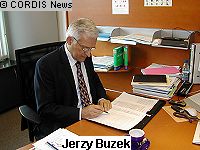Parliament's FP7 rapporteur promises to fight for the right outcome
The European Parliament's rapporteur on the Seventh Framework Programme (FP7) proposals has admitted that it will be very difficult to reach a timely decision on the issue as long as there is uncertainty surrounding the EU's financial perspectives for 2007-2013. MEP and former Polish Prime Minister Jerzy Buzek outlined his thoughts on the FP7 proposals and the political process now getting underway to adopt them during an interview with CORDIS News on 1 June. Asked whether an eventual reduction of the budget as proposed in the financial perspectives would necessarily mean a reduction in FP7 funding, or whether the money could be cut from other areas of EU expenditure, Mr Buzek responded: 'It will be very difficult to keep the FP7 budget if the financial perspective proposals are rejected.' However, Mr Buzek is still working on the basis of the figures proposed by the Commission, and prefers not to give too much consideration at this stage to compromises such as that suggested by the Luxembourg Presidency to cut the proposed EU budget by 30 per cent. 'We still want more money than the Luxembourg Presidency has suggested,' he said. 'If we want to achieve the Lisbon goals, we really shouldn't start the second half of the process with compromises on research spending.' Echoing a recurring theme of the Commission, Mr Buzek pointed out that other actors and programmes within Europe have just as much if not more of a contribution to make to research investment in Europe as the framework programme. He listed Member States' national budgets, the structural funds, the private sector and regional authorities as the four most obvious examples. Returning to FP7 itself, CORDIS News asked Mr Buzek which areas of the proposals he feels will generate the greatest amount of debate within the parliament. He cited traditional debates surrounding the participation of small and medium sized enterprises (SMEs) in the framework programmes, and how to improve the innovative output from EU funded research, which he believes will continue to be key questions for FP7. On the debate surrounding the future role of the JRC, Mr Buzek said: 'In this context it should be emphasized the crucial role of the Joint Research Centre as an unique EU institution supplying scientific support for the EU policymakers.' However, perhaps the biggest question for the coming framework programme, he said, is the need to reduce red tape and simplify the rules for participation, where a balance must be found between encouraging applications from research organisations of all types and sizes while guarding against the potential misuse of EU funds. Mr Buzek agrees with the Commission's assertion that introducing a two-stage submission procedure could greatly simplify the application process, and the wider introduction of electronic submissions would also be a step forward. 'MEPs have been calling for simplification of the framework programme for many years now,' he said. 'The issue is especially important now given the plans to introduce an 'Ideas' element to the programme with the European Research Council. With basic research it's very hard to plan everything three or four years in advance given the unpredictability of such endeavours.' Nevertheless, Mr Buzek is aware that any workable solution will have to strike a very delicate balance, and even though some will argue for a complete overhaul of the rules, he argues that 'we must be careful not to proceed too quickly with plans for simplification.' Given that he represents one of the EU's newer Member States, CORDIS News asked the former Polish Prime Minister whether he thinks the Commission's proposals adequately address the needs of the newer EU nations. He replied by saying that it is important to encourage organisations of all sizes and from all regions of Europe to participate in EU research projects, and he believes that the Commission's desire to reduce the emphasis on large networks and integrated projects will help to achieve this. Asked whether he agrees that scientific excellence should be the sole criterion for choosing projects given that this could result in more funding going to the best funded and largest institutions, Mr Buzek said: 'The participation of the 'core' scientific institutions is essential to the framework programmes, but it is equally necessary to allow for smaller initiatives involving the smaller actors and regions.' In building a true European Research Area (ERA), he added, it is vital to build capacities in 'convergence' regions because in five, eight or ten years time these will hopefully develop into centres of scientific excellence themselves. When asked how the actual process of adopting a common position on the proposals is proceeding in the Parliament, Mr Buzek revealed that he has set an ambitious timeframe for a decision. 'We have started with real energy!' he said. 'We want to have a first reading in December - which would be two months ahead of schedule compared with FP6 - then we would need a further five months to finish our work.' This timetable is dependent upon a swift decision being reached on the financial perspectives, however, which Mr Buzek accepts may be unlikely. The interest in the FP7 proposals within the Parliament has been considerable, apparently confirming that research has moved up the political agenda in recent months. Mr Buzek revealed that six or seven Parliamentary committees have already requested the opportunity to produce an opinion on the proposals, and he predicts this figure could yet rise. So to the crucial question: is he confident that he will be able to secure the right outcome for the proposals and for the future of EU research? Maybe it was his considerable political experience that stopped him from saying 'yes', and maybe it wasn't. But Mr Buzek did promise: 'I am going to fight very hard for that.'



